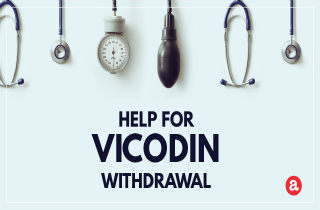Vicodin is an opioid blend of hydrocodone and acetaminophen. This opiate is prescribed usually to help with post-operative pain management. However, Vicodin’s relatively high dependence liability can make withdrawal a hard and uncomfortable process. And side effects from Vicodin withdrawal can persist for 7-10 days after cessation of use.
Here, we discuss what Vicodin withdrawal feels like, what helps withdrawal from Vicodin, and what you can expect over the course of the first few weeks after stopping Vicodin. Plus, a section on how to treat Vicodin withdrawal and its manifestations. As always, we invite you to ask questions about Vicodin at the end of the article.
Is Vicodin withdrawal dangerous?
No, Vicodin withdrawal is rarely dangerous.
However, the severity of withdrawal depends on the extent of chemical dependence to Vicodin. Dosage and the length of time are all factors that account for the intensity of withdrawal symptoms. Still, there are factors that can make Vicodin withdrawal more dangerous. Specifically, the potential symptoms that can be dangerous are: seizures, severe depression, and confusion.
Pre-existing conditions that effect your health or your ability for your body to repair itself can make Vicodin withdrawal dangerous. Additionally, mental health concerns can impact withdrawal. For example, if you are alone and you suffer seizures, this can put you in a compromising position. If you feel you may run the risk of seizures and/or have been diagnosed with extreme depression, talk to your doctor or make sure you can have someone around who can help you if you need it.
Is Vicodin withdrawal hard?
Vicodin withdrawal can be hard for several reasons. Withdrawal makes you physically sick. And Vicodin withdrawal can have an impact on your daily life (withdrawal can be a long and demanding process). Withdrawal also effects psychological well-being, as Vicodin alters the chemical makeup of the way you process serotonin and regulate your moods. So not only are you having to contend with physical pain and discomfort, you have to deal with the upset in your mental state of mind, which can exacerbate underlying mental health concerns.
Vicodin withdrawal methods: Help for Vicodin withdrawal symptoms
Withdrawal from Vicodin typically resolves in 7-10 days after cessation of use. Withdrawal usually begins after you’ve taken the last dose of Vicodin, with onset about 4-6 hours after this last dose has worn off. How can you address symptoms of Vicodin withdrawal?
Medications for Vicodin withdrawal
1. Tramadol is a popular pharmaceutical drug that can be prescribed in sever cases of Vicodin dependence. Compared with Vicodin, tramadol has low dependency and abuse rates. Your physician might actually replace Vicodin use with Tramadol and then taper the tramadol.
2. If you are suffering from severe Vicodin dependency and physical addiction, a stronger medication may be needed during withdrawal. Nnaltrexone and buprenorphine medications are prescribed to address drug craving and help during the detox process.
Natural help for Vicodin withdrawal
You can be address Vicodin withdrawal without the necessity of medical intervention. If you are highly motivated to withdraw from Vicodin, firrst speak with your prescribing doctor to work out a tapering plan. Then, be prepared to treat symptoms as they occur.
Withdrawal from opioids like Vicodin induces intense flu and cold like symptoms. Because of this, treat yourself like you have a severe flu. Take time off from work for a couple of days while you experience acute withdrawal. The greatest thing your body will need is rest and time to recover. Massage, warm showers, and heating pads can help take care of pain and soreness in the body. NSAIDs can address muscle aches and pains.
Furthermore, be careful of what you eat. Make sure food is soft on the body and doesn’t promote nausea. If you are having a hard time eating, make sure you are getting the fluids and electrolytes you need to stay hydrated. Sun lamps help promote essential vitamins that can help take care of psychological upsets and maybe help decrease the need for antidepressants. Figure out a wellness schedule. Stay regimented to this process so that your body can take care of itself.
How to ease Vicodin withdrawal?
Pharmacological and natural help are both ways you can help take care of withdrawal symptoms. However, if you want to ease the overall withdrawal process, it is always a helpful to work with a doctor to make withdrawal as painless as possible. Doctors can monitor the withdrawal and treat physical symptoms that come up. They can help refer you to people that can help with psychological symptoms. Doctors can also recommend a plan to reduce Vicodin doses over time (tapering). Often the best way to ease Vicodin withdrawal, tapering minimizes the severity of withdrawal symptoms so that they are less intense.This way, doctors can help you to reduce the amount of Vicodin you take and continually monitor and reduce until it is no longer in the body.
Help with Vicodin withdrawal
If you are having a hard time withdrawing from Vicodin, you can look for help in several places. If you have a regular physician, talk to them and maybe they can refer you to a detox clinic. During a medical detox, staff help you to get rid of Vicodin out of the system while physical withdrawal is being addressed. If you want to find resources for pain, support groups, or addiction treatment you can call 1-800-662-HELP (4357). This is a national hotline designed to get you in contact with addiction treatment centers.
Helping Vicodin withdrawal questions
Do you still have questions about the different ways of withdrawing from Vicodin? Do you have your own experience to share? We would love to hear from you. We respond to any questions you have personally and promptly.









Related Posts